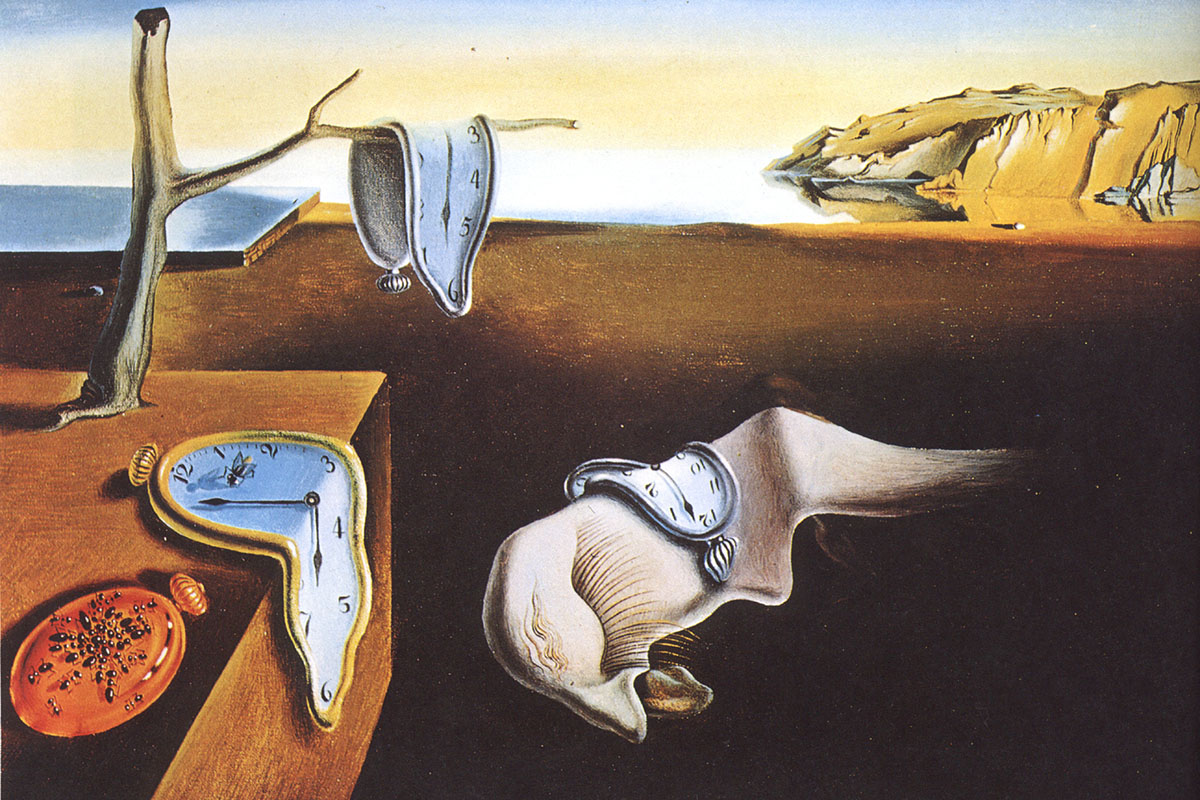Time

What is time? According to the Canadian Oxford Dictionary, time is the indefinite and continuous duration of existence seen as a series of events progressing from the past through the present into the future.
The pandemic has focused us on time. When will the lockdown end? When can we visit Grandpa? When will it be safe to go to the gym, or even to the supermarket, without worrying? Will it ever be my turn to get the vaccine? A first wave, then a second wave, and now talk of a third wave. Where is the end? What day is it anyway, for the days blend one into another?
I wonder if this is what the Jewish people felt like wandering in the desert headed for the promised land. The Exodus took forty years to complete, a generation of time spent in the desert searching for the end.
How long did forty days and forty nights of rain and water feel? It must have seemed like an eternity of misery and danger, a challenge to the faith of Noah and his family, and his precious cargo.
I read an article by Alex Hutchinson titled “COVID-19 is like running a marathon with no finish line. What does sports science say about how we can win it?” (The Globe and Mail November 21, 2020). He talks about the Quarantine Backyard Ultra, a race won by the last runner left standing.
Each of the over 2400 runners in 59 countries were to run 4.16 miles per hour consecutively, (which amounts to 100 miles per day), until one runner remained. Most people ran about 100 miles, seeing that goal as an end; further running beyond that perceived goal was difficult.
The winner Mark Wardian who ran 63 laps, was declared the winner when the other remaining runner failed to report on time for the next lap. What Wardian discovered through his wife’s encouragement was to not anticipate an end to the race, but to race each hour in the moment.
To identify no specific endpoint (while still acknowledging there will be and end) and to focus on the predetermined pace lowers heart rate and lowers the perception of effort. He ran in the present, not to a preassigned future end.
It turns out we humans, like migratory birds, react to an end. “Teleoanticipation” is the anticipation of the end of a physical task that allows more efficient expenditure of energy. It is why when we reach the final lap in a race, our natural tendency is to accelerate to the end, expending our remaining energy such that in a way, we use it all up to achieve the task.
Birds eat just enough food to migrate to their destination. Eating too much would make them heavier, and therefore slower. Just enough fuel to get there.
When we don’t have an end, we might make one up, or get demoralized when we can’t find it. Hence the disappointment when schools reopen and then close again, when the vaccine is coming, and then is held up.
I have to wonder that when our political leaders are desperate to see an end in sight, when things get a little better, they relax rules accelerating to the end they think they see, only to discover disappointment.
“Beware, keep alert; for you do not know when the time will come. It is like a man going on a journey, when he leaves home and puts his slaves in charge, each with his work, and commands the doorkeeper to be on the watch. Therefore, keep awake—for you do not know when the master of the house will come, in the evening, or at midnight, or at cockcrow, or at dawn, or else he may find you asleep when he comes suddenly. And what I say to you I say to all: Keep awake.” (Mark 13: 33-37)
Then he said to them all, “If any want to become my followers, let them deny themselves and take up their cross daily and follow me…” (Luke 9:23)
Rather than take these readings as cautionary tales, perhaps we can take a lead from the American comedian Joan Rivers: “Yesterday is history, tomorrow is a mystery, today is God’s gift, that’s why we call it the present.”
“When will the pandemic end?” is a question that can’t be answered. To find the present, God’s gift, in today, as hard as that might be, may be what Jesus is asking us to be alert for. One day at a time, find the present. That’s easy to say, not so easy to do; but it’s what we should do daily.
“But do not ignore this one fact, beloved, that with the Lord one day is like a thousand years, and a thousand years are like one day.” (2 Peter 3: 8)
I pray that you will have at least one moment during these difficult times that you will treasure for a thousand years, and that when this pandemic is over, it will seem like just one day, when we step into the new better normal.




Peter Bisson
Posted at 01:02h, 13 AprilThank you Mike!
Richard Grover
Posted at 08:35h, 13 AprilBrilliant Michael. Faith and intelligence….2 ways of arriving at the same conclusion.